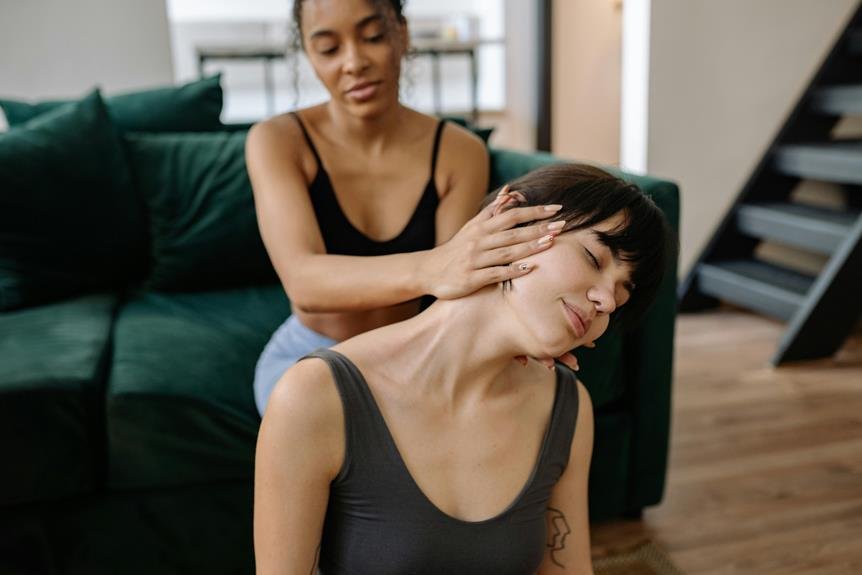
When stress takes its toll, seeking effective relaxation techniques becomes crucial. Imagine a world where you can effortlessly unwind and let go of the day's burdens. The key lies in mastering certain practices that can help you achieve a state of tranquility and peace. By exploring the realm of relaxation techniques, you open yourself up to a realm where stress dissipates and serenity takes its place. The journey to discovering the best methods to alleviate stress begins with a simple step towards embracing relaxation.
Deep Breathing Techniques
To reduce stress effectively, try practicing deep breathing techniques regularly. Deep breathing can help calm your mind and body, promoting relaxation in stressful situations. Start by finding a quiet place to sit or lie down comfortably. Close your eyes, inhale deeply through your nose for a count of four, hold your breath for a count of four, then exhale slowly through your mouth for a count of six. Repeat this cycle several times, focusing on your breath and letting go of any tension or worries with each exhale.
As you continue deep breathing, you may notice your heart rate slowing down and your muscles relaxing. This simple yet powerful technique can be done anywhere, anytime, providing you with an immediate sense of calm and clarity. Incorporating deep breathing into your daily routine can help you manage stress more effectively, improving your overall well-being. Remember, the key is consistency – the more you practice deep breathing, the easier it will become to access this relaxation response when you need it most.
Progressive Muscle Relaxation
How can you effectively practice progressive muscle relaxation to reduce stress and promote relaxation in your body and mind?
Progressive muscle relaxation involves tensing and then slowly releasing each muscle group in your body to help release tension and induce a state of calm.
Start by finding a quiet and comfortable place to sit or lie down. Close your eyes and take a few deep breaths to center yourself.
Begin by focusing on your feet, curl your toes tightly for a few seconds, then release. Move on to your calves, thighs, and gradually work your way up through your body, tensing and relaxing each muscle group.
Remember to breathe deeply and slowly throughout the process.
Mindfulness Meditation
Engage in mindfulness meditation to cultivate present moment awareness and promote mental clarity and relaxation. Mindfulness meditation involves focusing your attention on the present moment without judgment. Find a quiet space, sit or lie down comfortably, and start by bringing awareness to your breath. Notice the sensation of each inhale and exhale, allowing thoughts to come and go without getting caught up in them. As you practice mindfulness meditation regularly, you may begin to observe a sense of calmness and increased self-awareness.
Research suggests that mindfulness meditation can reduce stress, anxiety, and depressive symptoms. By training your mind to stay present and attentive, you can learn to respond to stressful situations with more clarity and composure. This practice can also help improve concentration and cognitive function. Start with just a few minutes each day and gradually increase the duration as you become more comfortable. Remember, the key isn't to strive for a completely empty mind, but rather to acknowledge your thoughts and gently guide your focus back to the present moment.
Yoga and Stretching Exercises
Cultivate physical and mental relaxation through the practice of yoga and stretching exercises. Incorporating these activities into your daily routine can help release tension, improve flexibility, and promote overall well-being. Yoga combines physical postures, breathing techniques, and meditation to enhance relaxation and reduce stress. By focusing on the present moment during yoga practice, you can quiet the mind and create a sense of calm.
Stretching exercises are also beneficial for reducing stress and promoting relaxation. Stretching helps to increase blood flow to your muscles, releasing built-up tension and promoting a sense of relaxation throughout your body. Whether you prefer gentle stretches or more dynamic movements, taking time to stretch regularly can help alleviate physical and mental stress.
Consider setting aside a few minutes each day to engage in yoga or stretching exercises. Whether it's a quick morning routine or a relaxing evening practice, these activities can have a profound impact on your stress levels and overall well-being. Start incorporating yoga and stretching into your daily routine to experience the benefits of physical and mental relaxation.




